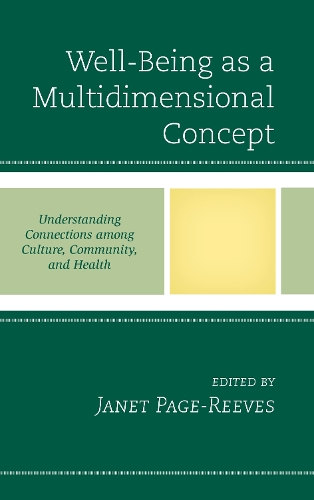
Well-Being as a Multidimensional Concept: Understanding Connections among Culture, Community, and Health
(Hardback)
Available Formats
Publishing Details
Well-Being as a Multidimensional Concept: Understanding Connections among Culture, Community, and Health
By (Author) Janet M. Page-Reeves
Contributions by John Andazola
Contributions by Courtney Andrews
Contributions by Melinda Davis
Contributions by Jaelyn deMara
Contributions by Kristen Dillon
Contributions by Alicia Edwards
Contributions by Sarah Gopman
Contributions by C. Estela Vasquez Guzman
Contributions by Gale G. Hannigan
Bloomsbury Publishing PLC
Lexington Books
1st July 2019
United States
Classifications
Professional and Scholarly
Non Fiction
306
Physical Properties
Hardback
460
Width 160mm, Height 230mm, Spine 34mm
912g
Description
Well-Being as a Multidimensional Concept highlights the ways that culture and community influence concepts of wellness, the experience of well-being, and health outcomes. This book includes both theoretical conceptualizations and practice-based explorations from a multidisciplinary group of contributors, including distinguished, widely celebrated senior experts as well as emerging voices in the fields of health promotion, health research, clinical practice, community engagement, and health system policy. Using a social science approach, the contributors explore the interface among culture, community, and well-being in terms of theory and research frameworks; culture, community, and relationships; food; health systems; and collaboration, policy, messaging, and data. The chapters in this collection provide a broader understanding of well-being and its role as a culturally embedded and multidimensional concept. This collection furthers our ability to apprehend social and cultural constructs and dynamics that influence health and well-being and to better understand factors that contribute to or prevent health disparities.
Reviews
This book peels away the gloss and hype about `wellness to give an unvarnished view of the topic from the front lines, delivered with poignancy from those working in the trenches with the most vulnerable among us. Here, the importance of culture and community ring out as different chapter authors reveal perspectives of those who are disabled, infected, addicted, or lonely. Here, youll find the perspective of African-Americans reviving traditional food choices, of indigenous people grappling with historical trauma, of women beset by addiction struggling to keep their children while dealing with intergenerational trauma, and even resident physicians suffering abuse in a stressed, often toxic environment. -- Art Kaufman, University of New Mexico
Author Bio
Janet M. Page-Reeves is associate professor in the Department of Family and Community Medicine and the director of research for the Office for Community Health at the University of New Mexico Health Sciences Center.
